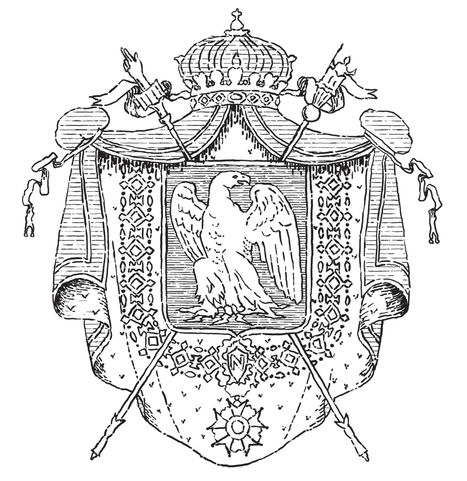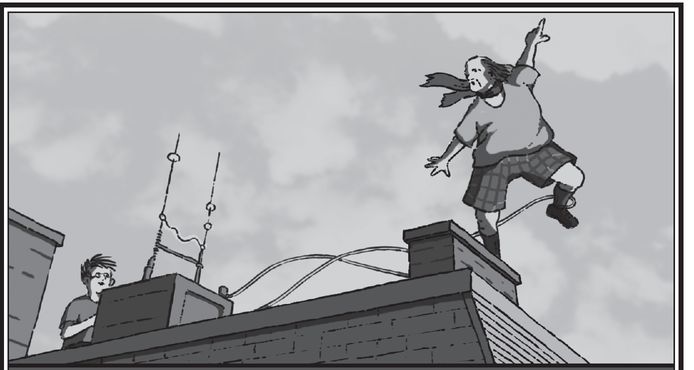Benjamin Franklinstein Meets the Fright Brothers (2 page)
Read Benjamin Franklinstein Meets the Fright Brothers Online
Authors: Matthew McElligott

BOOK: Benjamin Franklinstein Meets the Fright Brothers
4.2Mb size Format: txt, pdf, ePub
Orville nodded. “Very well. What must I do?”
“We shall leave it to your Custodian.” He gestured to a tall man who waited silently behind the open Leyden casket. Orville had not noticed him standing there. “He will perform the suspension-of-life procedure.”
The Custodian led Orville up a small step to the casket, assisting him into the blue liquid. The fluid immediately began to glow. The Custodian gently fitted a rubber mask over the old man's mouth and nose.
“Do not worry,” the Custodian said. “I am told it is like sleep. You and your brother will be reunited, one day. And it will seem as only an instant.”
Orville looked at his brother's casket. It had been so many years. So many decades. He sighed, closed his eyes, and lowered the rest of his body into the fluid. The Custodian closed the lid and sealed the latch. Air bubbles rose to the top of the casket. Orville Wright was breathing normally.
The Custodian flicked a switch, and the steady rhythm of Orville's heartbeat blipped from a speaker. He gripped a lever and pushed it up. The Tesla coil hummed. At first it gave off a low, soft buzz, but within seconds the noise grew louder, more high-pitched, deafening.
Sparks wheeled off from the coil at the center. Suddenly, the room was awash in bolts of lightning that sliced the air, crackling from the dome at the top. Ribbons of raw energy flashed, racing around the cage. The Leyden caskets were bathed in electricity. Monsieur Enbée and the Custodian shielded their eyes.
An alarm blared from the control panel, and red lights flashed a warning.
“Quick!” shouted Monsieur Enbée. “Stabilize the neutron flow!”
The Custodian reached for the lever but snapped his hand back, howling in pain. “It's hypercharged!”
He flung open a cabinet and snatched out two vulcanized rubber gloves. “Stand back, Monsieur Enbée!”
The small man retreated into a corner as the Custodian gripped the lever and pulled down with his full weight. Slowly, it descended. As it did, the lightning that had filled the room drew back into the Tesla coil. The crackle and hum of pure energy softened and then vanished.
The Custodian pounded a large button with his fist. The flashing red lights and buzzing ceased. He removed his goggles and gloves. “It's safe. We've reached bioelectric homeostasis.”
Monsieur Enbée slowly approached Orville Wright's Leyden casket. “Did it work? I'm not hearing a heartbeat. The Order cannot afford to lose another one.”
“Wait,” the Custodian said.
They waited. Ten seconds . . . twenty seconds . . . thirty seconds ...
Blip! . . . Blip! . . .
“Ah,” Monsieur Enbée said, with a sigh of relief. “He lives.”
“But we almost lost him,” the Custodian said. “I warned you, Enbée. Tesla's machine is dangerous.”
“You just keep him alive,” the short man snapped back. “As long as I am in charge, it is not your place to question the Order's methods.”
“Yes, sir. My apologies, sir.”
The small man stepped into the elevator and pushed the button. “And in the future, you will remember to refer to me as
Monsieur
Enbée.
Comprenez-vous?
”
Monsieur
Enbée.
Comprenez-vous?
”
“Yes, Monsieur Enbée,” the Custodian said. “I understand.”
The doors closed on the small man. The elevator began to grind its way to the surface.
“Know your place, Custodian,” called Monsieur Enbée, “and remember your duty. I have put great trust in you!”
Then why,
the Custodian thought,
do I find it so difficult to trust you?
the Custodian thought,
do I find it so difficult to trust you?
Â
IMPERIAL COAT OF ARMS OF FRANCE (EARLY 19TH CENTURY)


CHAPTER ONE
Philadelphia, Today
It was a typical
, sunny summer afternoon on Karloff Avenue. A woman was watering the plants in her garden. A mailman was making his daily rounds. Two mothers with strollers chatted on the sidewalk.
, sunny summer afternoon on Karloff Avenue. A woman was watering the plants in her garden. A mailman was making his daily rounds. Two mothers with strollers chatted on the sidewalk.
And high above them, balanced precariously on the chimney of the oldest house on the block, Benjamin Franklin was disco dancing while mooing like a cow.
Had anyone on the street happened to look up, it is unlikely they would have recognized the great American patriot. He wore Bermuda shorts, a tattered T-shirt, and a scarf to disguise the strange metal bolts in his neck. He danced vigorously, although there was no music playing. Two sparking electrical cables were clipped to the garters on his tall black socks. The cables ran to a rusty old machine, which was being carefully monitored by a boy sitting on a wooden crate.
Fortunately, no one on the street happened to look up. If they had, they would surely have called the police.
“Point your left hand a little more to the west,” called Victor. He studied a gauge. “I'm certain we've found the right frequency. Maybe the signal strength is still too low? Try humming again.”
“Mooooooooo . . .”
“Can you hum louder? And really swing your hips back and forth this time. We need to get you in phase with the chromatic overtones.”
Franklin nodded and intensified his dance. The wires on his socks began to crackle and flash.
“MOOOOOOOOOOOOOOOO! MOOOOOOOOOOOO!”
Victor watched the needles on the gauge swing back and forth. “That helps. Can you sense anything yet?”
Franklin huffed and shook his head.
“MOOOOOOOOO! . . . Nothing . . . MOOOOOO . . . at . . . MOOOOOO . . . all . . .”
“MOOOOOOOOO! . . . Nothing . . . MOOOOOO . . . at . . . MOOOOOO . . . all . . .”
“Maybe if youâ”
BOOM!
A bright blue flash lit the air, followed by a puff of dark black smoke. The old man tumbled off the chimney onto the roof below.
Victor raced to Franklin's side. “Ben, are you okay?”
Franklin blinked and slowly pulled himself upright. “I'm fine,” he said. “Never better.”
“What happened?”
“Exactly what I feared might happen.” He nodded down toward his feet, where two black rings now encircled his bare ankles. “My socks exploded.”
“Yikes! I'm sorry.”
“Nonsense. They were old socks. Besides, your idea was sound. What better antenna for the electrophone than my own harmonically charged body? It was a brilliant insight.”
“I was so sure we were on to something. Your movements gave us great reception, and when you hummed, the resonance indicator went all the way to full. I don't understand why we didn't pick up some sort of signal.”
Franklin stood and dusted himself off. “Victor, I'm afraid the evidence is clear. There is no signal. We are alone.”
“I don't agree.”
“We have to face facts. The electrophone is the only way to contact any remaining members of the Modern Order of Prometheus. If no one is answering, then it can mean only one thing: the Order is no more.”
“We don't know that for sure.” Victor walked to the edge of the roof. “Look, you were asleep in the basement for over two hundred years. Then, a few weeks ago, out of the blue, something suddenly woke you up. Why?”
“What woke me was nothing more than a random strike of lightning.”
“That's one possibility. Another is that the Modern Order of Prometheus woke you because they need your help. Maybe whenever they've tried to contact you, we just haven't been around.”
“It has been a month,” said Franklin. He stood beside Victor, watching the people go about their business on the street below. “We have monitored the electrophone regularly, in every possible way, and have yet to receive a single transmission.”
Victor turned his gaze toward the Philadelphia skyline. “You're right. I know that. But I'm not ready to give up yet. I can't explain why.”
Franklin smiled. “Victor, that doesn't sound very scientific. And from you, of all people!”
Victor's face reddened. “It's just, you know, a gut feeling.”
“Then we press on. If there is one thing I believe in, it is following my gut. Speaking of which, how about something to eat?”

Downstairs in the Godwin apartment, Victor fixed some snacks in the kitchen while Franklin turned on the TV.
“Remind me again,” Franklin called. “Where do I find the channel with the moving drawings?”
Recently, television had become Franklin's obsession. What surprised Victor were the types of programs Franklin chose to watch. He found C-SPAN, the news, and the History Channel interesting, but what he really loved were cartoons.
“Try channel thirty-two.”
Victor could hear Franklin cursing at the remote in the other room. “The blasted television wand is broken again!”
“Have you pushed the On button?”
The television clicked on. “Never mind, I repaired it!” Franklin hollered.
Victor emptied the microwave popcorn into a bowl and poured two glasses of honey lemonade. When he entered the living room, Franklin was watching an anchorman on the local news.
“And now for the weather. Skip, how are things looking for tomorrow? Can we count on a sunny Fourth of July?”
“Oh, hurrah!” exclaimed Franklin. “It's Skip Weaver! I wonder what sort of tomfoolery he has in store this time.”
Victor sighed. For better or for worse, Skip's son, Scott Weaver, was the closest thing he had to a friend at Philo T. Farnsworth Middle School. Scott never seemed to take anything very seriously, and his dad was the same way. Victor, on the other hand, took everything seriously.
On the television, Skip Weaver rode a scooter back and forth in front of the weather map. A cardboard pizza box emblazoned with a crude Magic Marker drawing of the sun was taped to the handlebars. On the screen behind him, animated storm clouds ran for their lives.
“The sun is chasing the clouds away!” howled Franklin. “Have you ever seen such a spectacle?”
Victor rolled his eyes.
Suddenly, the pizza box fell from the front of Skip's scooter and caught in the wheel. Skip lost control and skidded directly toward the camera. Something heavy crashed to the floor and the entire newsroom seemed to tip on its side. The screen went black, and the station cut to a used car commercial.
“Bravo!” cheered Franklin. “Bravo! Oh, it's pure genius!”
“It's embarrassing,” said Victor. “If I want to see a clown, I'll go to the circus.”
“Victor, that's Scott's father! Show some respect.”
Victor snorted. “Watching his forecast is like watching a cartoon.”
“My cartoons!” Franklin blurted. “Now where did I place that wand?” He reached beneath the seat cushion and rummaged for the remote. The commercial ended and the news came back on.
“Coming up, we'll take a look at those new electricityfree miracle lightbulbs that have been showing up in stores throughout the city. Do they really work? We'll find out! But first, we join Mayor Milstead's press conference, already in progress.”
Other books
Sinners On Tour 06.1 Take Me to Paradise (Encores #1) by Olivia Cunning
We Will Always Have the Closet by Natalina Reis
The Clarendon Rose by Anthony, Kathryn
Fitting In by Violet, Silvia
A Taste of Love by Willis, Susan
Made by Hand by Mark Frauenfelder
02 The Secret on Ararat by Tim Lahaye
Hawksmoor by Peter Ackroyd
The Girl in the Steel Corset by Kady Cross
Charming the Alphas (Hex My Heart, #5) by Talina Perkins